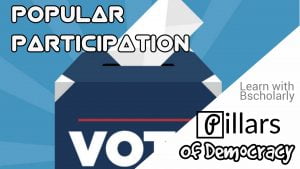Types of electoral system: The issue bothering on election and the entire electoral process is one with some level of controversy surrounding it. This is because different countries practice different electoral systems, and people who seems to practice the same type of electoral systems have some areas of divergence. It then appears as though the Electoral Commission superintending over elections have more say in making different reforms to suit the particular system.

In light of the above, we will be taking a look at the different types of electoral system, their meaning, advantages and disadvantages in this article. I highly recommend that you read this article painstakingly if you want to know all about electoral processes and procedures.
What is electoral process?
Electoral process is defined as the procedure by which citizens of a state have decided to adopt in choosing their leaders. The process of choosing their leaders is known as Election. Election is divided into two broad category which are; Direct Election and Indirect Election.
By direct election, citizens reserve the right to individually choose those that will represent their interest and opinions either in the executive or other government positions. It should be noted, however, that some prerequisites must be met before one qualifies to exercise the right to vote.

For a better explanation of what electoral process is all about, I enjoin you to watch this wonderful article. Trust me, you are gonna love it.
https://www.youtube.com/watch?v=R7i0UF07nSw
Types Of Franchise
1) Limited Franchise otherwise known as restricted Suffrage.
2) Unlimited Franchise otherwise called Universal Adult Suffrage.
In limited franchise, all qualified adults are allowed to vote and be voted for. However, the right to vote is highly restricted to certain citizens and who meet up the requirements laid down by the law. The law may provide the minimum age as well as mental or moral standards for voting.
The criteria for voting and to be voted for vary from country to country. Using Nigeria as a case study, for one to qualify for the night to vote, such must attain the minimum of 18 years. But in Germany and India, it is 20 and 21 years respectively as provided by the law.
Other Qualifications in Restricted Franchise
a) Property Qualification: Here the voter is expected to posses some property which may include Land, House, or even an industry.
b) Income Qualification: This requires that the voter must attain certain level of education before being eligible to vote, and also prove that he earns certain amount of income as may be prescribed by the law.
c) Educational Qualification: This requires that a voter must attain a certain level of education before being eligible to vote. It may also be that the voter must be reasonably literate, in other words,it means that only educated or literate people are allowed to vote.
d) Sexual Qualification: In some places, for instance Northern Nigeria in the pre-independence era, only men are allowed to vote. This means that women are forbidden from exercising their right to franchise.
Unlimited Franchise also known as the Universal Adult Suffrage, allows all qualified adults to vote and be voted, therefore there are no hard and fast rules under this kind of Suffrage.
Also read: Differences between a Military and Democratic Government
Characteristics of electoral Systems
1) There must be an impartial and independent electoral commission
2) There must be periodic elections
3) Delimitation of the country into constituencies should be in place
4) There must be an acceptable method of nominating candidates for election.
5) There should be an independent Judiciary that should handle election petitions without fear or favor.
6) The voting atmosphere should be free from intimidation, victimization and molestation.
7) There should be a comprehensive voters register that embraces all qualified voters, such register must be subject to review from time to time.
Types Of Electoral System
Below is a list of the different types of electoral systems:
1) Simple majority system
2) Absolute majourity system
3) Second ballot system/ run-off system
4) Alternative voting system
5) Proportional representation system
6) Ballot or voting system
The Simple Majority System
This system is very simple and it is also referred to as “first past the post” This is a system in which the candidate with the highest number of the total vote cast is declared the winner, no matter the proportion of vote cast during election. Countries that practice this system includes the following, Britain, Canada, Ghana, Nigeria etc.
For example if election candidate A, B and C scored 4,800, 4,500 and 700 respectively in an election, candidate A is declared the winner because he scored the highest number of the total vote cast among all the contestants.
Advantages of Simple Majority System
1) It is very simple to operate as it’s name implies.
2) It makes it very easy and clear for the election result to be determined.
3) It discourages the formation of Coalition government.
4) It does not encourage the formation of many political parties.
Disadvantages Of Simple Majority System
1) It is undemocratic since it neglects the wishes of the majority of the voters.
2) Majourity ethnic groups can use their numerical strength to secure a simple majority system at the expenses of a minority group.
3) The system leads to waste of surplus votes of the majority of voters.
4) It encourages election rigging in order to secure the highest number of votes.
RECOMMENDED: 7 Major Pillars of a democratic government
The Absolute Majority System/ Second Ballot System
Another name for this type of electoral system is the second ballot system. This system requires that whoever will be declared winner must secure 50% of the total vote cast. If at the first ballot no candidate gets this majourity, a second voting called the second ballot becomes necessary.
The candidates with the least number of votes will be withdrawn before the second ballot takes place. One candidate usually obatains an absolute majourity of 50%, but when this is not obtained, the candidate with the highest number of votes will be declared the winner.

Disadvantages Of Absolute Majority/ Second Ballot System
1. It is very expensive both in time and in money.
2. It leads to voter apathy, voters whose candidate are dropped in the first ballot may not wish to participate subsiquently
It can lead to tensions and political violence
3. The results are unnecessarily delayed if the process requires the second ballot system.
Advantages of Absolute Majority System/ Second Ballot System
1. It encourages the emergence of the winner with the support of the majourity of the electorate.
2. It gives room for elimination of unpopular candidates.
3. It makes it imperative for political parties to credible candidates if they are to win.
RECOMMENDED: Differences between Cross-offers and counter-offers
Alternative Voting System
In this system, the electoral commission are to arrange the candidates in their numbers (eg. 1, 2, 3, 4, 5) and the electorates are to arrange in order of preference. That is to say that the voter will rate the candidates by numbering them in order of his preference.
The candidate with the highest number of first rating from voters will be declared the winner. Australia is a good example of countries that practice this system of voting.
Advantages of Alternative Voting System
1. The system represents the interest of the of the various groups in the country.
2. It shows a government with a picture of the support from the people.
3. It is democratic in nature.
4. It avoids waste of votes.
Disadvantages Of Alternative Voting System
1. It gives room for the formation of many political parties.
2. It is complex and therefore makes it difficult to operate.
3. It gives room for election malpractice
4. It is very expensive
Also read: How to answer law problem questions using IRAC method
Proportional Representation System
This system is a process adopted in electing representative in multiple member constituencies, and it is used to secure representation in the legislature. In the system, every political party gets seats in proportion to the percentage of vote cast. The more the percentage of vote cast secured by the candidate, the more the seats allocated to the party.
Advantages of Proportional Representation System
1. It gives a true picture of popular votes.
All interest gruops in a system are fully represented.
2. Both interest of majority and minority are protected.
3. Voters have wider choice especially in multiple member constituencies.
Disadvantages Of Proportional Representation System
1. The multiplicity of political parties may bring about violence in the system.
2. The system is prone to political instability.
3. Voters can easily vote blindly in this system. This is as a result of too many political parties that cannot be easily assessed by the people.
4. The system is too expensive to operate.
RECOMMENDED: Advantages and disadvantages of an unwritten constitution
The Ballot or Voting System
There are two majour ballot or voting system, namely:
1. Secret ballot voting.
2. Open ballot system.
Secret Ballot System: In this system, the voter casts his vote in an enclosure called pooling booth. He secretly marks the candidate or party of his choice on the ballot papt. In this system, secrecy is guaranteed and a voter can vote whoever he seems fit without intimidation or victimization. Secret ballot is one of the requirements for a free and fair election.
Open or Public Ballot System: Before the 19th century, there was no secret ballot as it operates today. It was the open ballt that was in Vogue. The open ballot involves the electorates either queing up to be counted openly, or standing behind the candidates of their choice to be counted publicly.
The candidate with the highest votes or support is declared the winner. Example of countries that operated this system includes Denmark (until 1901) and the Soviet Union (until 1936). This system is still used in villages to choose officials by a raise of hand.
So far, i have explicitly explained and discussed the different types of electoral system, their advantages and disadvantages. I believe this article has given you every basic information you need to know about voting systems. Nonetheless, if you still have questions or contributions on this topic, kindly drop it at the comment box.

Edeh Samuel Chukwuemeka, ACMC, is a lawyer and a certified mediator/conciliator in Nigeria. He is also a developer with knowledge in various programming languages. Samuel is determined to leverage his skills in technology, SEO, and legal practice to revolutionize the legal profession worldwide by creating web and mobile applications that simplify legal research. Sam is also passionate about educating and providing valuable information to people.